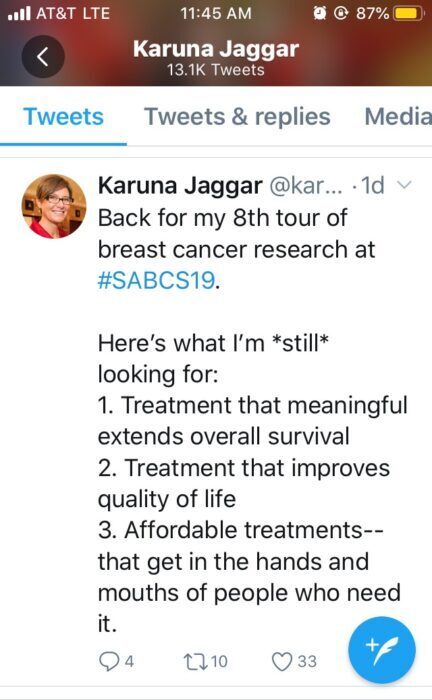by Karuna Jaggar, Executive Director 
I feel like I saw unicorn today.
I began Day 1 of the San Antonio Breast Cancer Symposium with this tweet:
“Back for my 8th tour of breast cancer research at #SABCS19. Here’s what I’m ‘still’ looking for:
This does not go without saying. In fact, most new cancer treatments approved by the Food and Drug Administration (FDA) have not been shown to help people live longer (extend overall survival). And too often these treatments come with significant toxicities, including what’s come to be known as financial toxicity—that is, the uniquely American financial harms that may last a lifetime because of expensive, even bankrupting, treatments.
So when the very first presentation in the very first session on the very first day (GS1-01) opened with overall survival data, it got my attention. And when the study design included people with metastatic breast cancer who’ve already had several other treatments (known as “heavily pretreated patients”), I really sat up, since such patients are often excluded from clinical trials so as not to “complicate” the data. But I knew I was looking at a unicorn when the researcher reported that around half of the trial participants had brain metastases, which is almost always a deal-breaker for any clinical trial (because of fears that the drug will be unable to cross the blood-brain barrier and so will be ineffective).
The study, which is named HER2CLIMB and which was simultaneously published in the New England Journal of Medicine (NEJM), compared treatment with either tucatinib or placebo, in combination with trastuzumab and capecitabine. Tucatinib is an experimental, small molecule tyrosine kinase inhibitor that is highly selective for HER2. It can be taken orally and has fewer side effects than other tyrosine kinase inhibitors.
Rashmi Murthy presented the results of the HER2CLIMB Trial, a randomized, double-blind, placebo controlled Phase III trial that included just over 600 patients at 155 sites in 15 different countries. All patients had HER2-positive metastatic breast cancer (MBC): 410 were randomized to tucatinib and 202 were randomized to the control arm. Participants had previously been treated with trastuzumab, pertuzumab, and ado-trastuzumab emtansine (T-DM1). Participants’ cancers had progressed after at least two rounds of previous therapy and the median number of prior treatments was four. And a full forty-seven percent of the patients enrolled in the trial had brain metastases at the time of enrollment.
Tucatinib improved overall survival (as well as progression-free survival and objective response rate) compared to the control arm, and these findings were statistically significant. At the two-year mark, 45% of patients taking tucatinib were alive (overall survival) compared to 27% who did not receive the experimental drug. At the one-year mark, a quarter of women whose cancer had spread to the brain—which is difficult to treat—were alive with no progression (what’s known as progression free-survival). Side effects included diarrhea and reversible elevations of liver enzymes. Around 6% of patients taking tucatinib stopped treatment because of side effects, twice as high as the control arm.
Seattle Genetics is already working to get FDA approval for tucatinib in HER2-positive breast cancer. With no price limits on new treatments in the US, it remains to be seen how much they’ll charge.
Too many clinical trials exclude the very people who need them most. Not only did this trial include people who’ve previously been treated for metastatic HER2+ breast cancer that’s spread to the brain, it helped some of them live longer. Now we need to see that the people who need it will be able to afford it. Because even drugs with overall survival data won’t work unless people can access them.
I believe in the power of unicorns. And I know that it takes a large, diverse herd of unicorns to be sustainable. I’ll be on the lookout for more unicorns. And I’ll also let you know when I see fake unicorn impersonators trying to pass as the real deal!